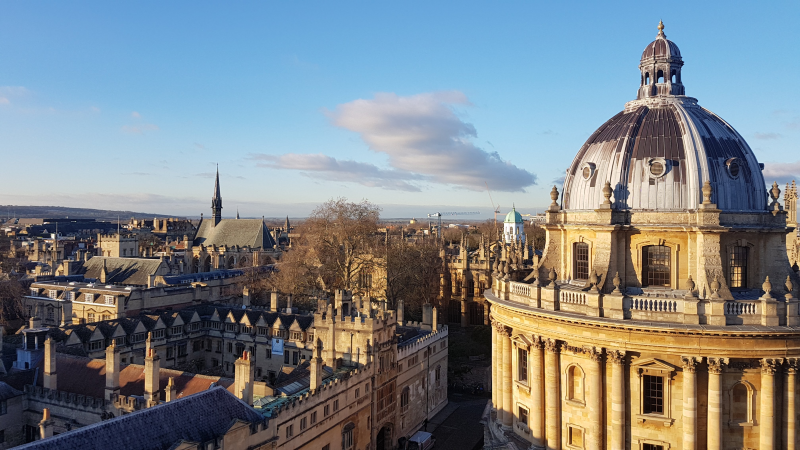European Coral Reef Symposium: Oxford
Alyssa Bell
University of Glasgow

The European Coral Reef Symposium (ECRS) is the largest coral reef conference in Europe. This year, hundreds of delegates from Europe and further afield congregated at the University of Oxford’s Examination Schools for a three day celebration of coral reef research and the exciting launch of International Year of the Reef 2018.
One of the major themes of the conference was sustainability and environmental responsibility. The conference promoted the #OneLess campaign, which aims to reduce the use of single use plastic and we were given goodie bags with reusable coffee cups (to fuel our conference excitement), carved wooden name badges and even a biodegradable bamboo toothbrush! But that’s not all: we were even challenged to use renewable power to charge our phones by way of pedal power!
I gave an oral presentation entitled: “The potential for non-scleractinian hosts to act as Symbiodinium reservoirs”. I was especially excited because it was the first time I’d be able to present my research in a session dedicated to my particular area of interest, coral symbionts. I was able to discuss my research and exchange ideas with several new contacts, as well as reconnecting with scientists I met at previous conferences.
Attending this conference was an inspiring and productive experience at a crucial point of my PhD, and I am extremely grateful to the Challenger Society for their financial support, without which I would not have been able to attend.
Profile:
Alyssa Bell is a third year PhD student in the School of Geographical and Earth Sciences at the University of Glasgow. Her PhD research focuses on the interactions between coral reef organisms and their symbiotic algae.
Before starting her PhD, she completed a Bachelors’ and Master’s degree in Zoology at the University of Glasgow. Her research interests include coral reef ecology and the effects of climate change and anthropogenic disturbance on reefs and their inhabitants.
Picture caption:
Looking over the Bodleian Library’s Radcliffe Camera, one of the oldest Libraries in the world (and location of several Harry Potter scenes) and Brasenose College to the left from the dizzyingly high tower of the University Church of St Mary the Virgin.
Latest News
Marine Data Management, Governance and the MEDIN toolset
The Marine Environmental Data and Information Network (MEDIN) and OceanWise are delighted to invite you to attend our popular free online training workshop: ‘Marine Data Management, Governance and the MEDIN toolset’ on the 19th – 23rd of May 2025.
Workshop on the contribution of UK Arctic Ocean science to the International Polar Year 32/33
12:00 11th June – 16:00 12th June 2025: NOC Southampton (In-person with online option): Registration deadline 16th May
REGISTER HERE
Pre-meeting questionnaire (open to all)
The purpose of this workshop is for the UK Ocean Science community to discuss and then draft a prospectus document outlining the priority Arctic research questions the community would like to address during the run up to, throughout and beyond the International Polar Year 32/33. Additionally, to identify what unique strengths and technologies the UK has to help fill these knowledge gaps.
The second day of the workshop will be dedicated to writing groups, one for each of the priority research questions identified - from both the pre-meeting questionnaire (HERE) and day one discussion. By the end of the meeting, each group will have produced draft text and sourced supporting figures for the prospectus.
Post meeting, the draft will be opened for comments and suggestions from everyone, regardless of whether they were able to attend the workshop or not. It will then be shared with UK funders (UKRI, FCDO, DSIT, ARIA) and potential international programmes with whom we would like to collaborate (e.g. Arctic 2050, Norway). It will form a basis from which wider integration with terrestrial, atmospheric and cryosphere communities can be built, e.g. at the UK Arctic Science Meeting in September in Northumbria.
To ensure balanced community and ECR representation, and to ensure that the size of the writing groups is efficient and effective, if the number of registrations from individual institutes becomes overwhelming, we may contact individuals or teams and ask that each institute selects a smaller number of individuals to attend in-person. Please wait for confirmation of in-person attendance before finalising travel arrangements.
The workshop will be open to hybrid attendance and contributions on both days.
Challenger Society Council Position Vacancy
The Challenger Society for Marine Science (CSMS) are pleased to announce an exciting opportunity to support the next generation of ocean scientists and innovators. CSMS are looking for a new Council member to fill the Student Travel Awards and Stepping Stones Portfolio. The successful applicant will administer the travel and research grants available for Early Career Researchers.
The role involves:
- Receiving applications for the two schemes and responding to applicant inquiries
- Soliciting and compiling input from the rest of the Council for assessing the applications
- Communicating with successful and unsuccessful applicants for the two schemes
- Working with the Honorary Treasurer on allocating funds to successful applicants
- Following up with award winners on their reporting requirements
- Attending Council meetings four times a year (in person or online) and contributing to discussions and decision making for CSMS
The usual term for Council members is three years.
For more information about the CSMS Council, please follow this link: https://www.challenger-society.org.uk/The_Council
For more information about our Early Career Researcher grants and awards, please follow this link:
https://www.challenger-society.org.uk/Stepping_Stones
and
https://www.challenger-society.org.uk/Travel_awards
If you are interested in applying or have any questions regarding the role, please contact kathen@bas.ac.uk
